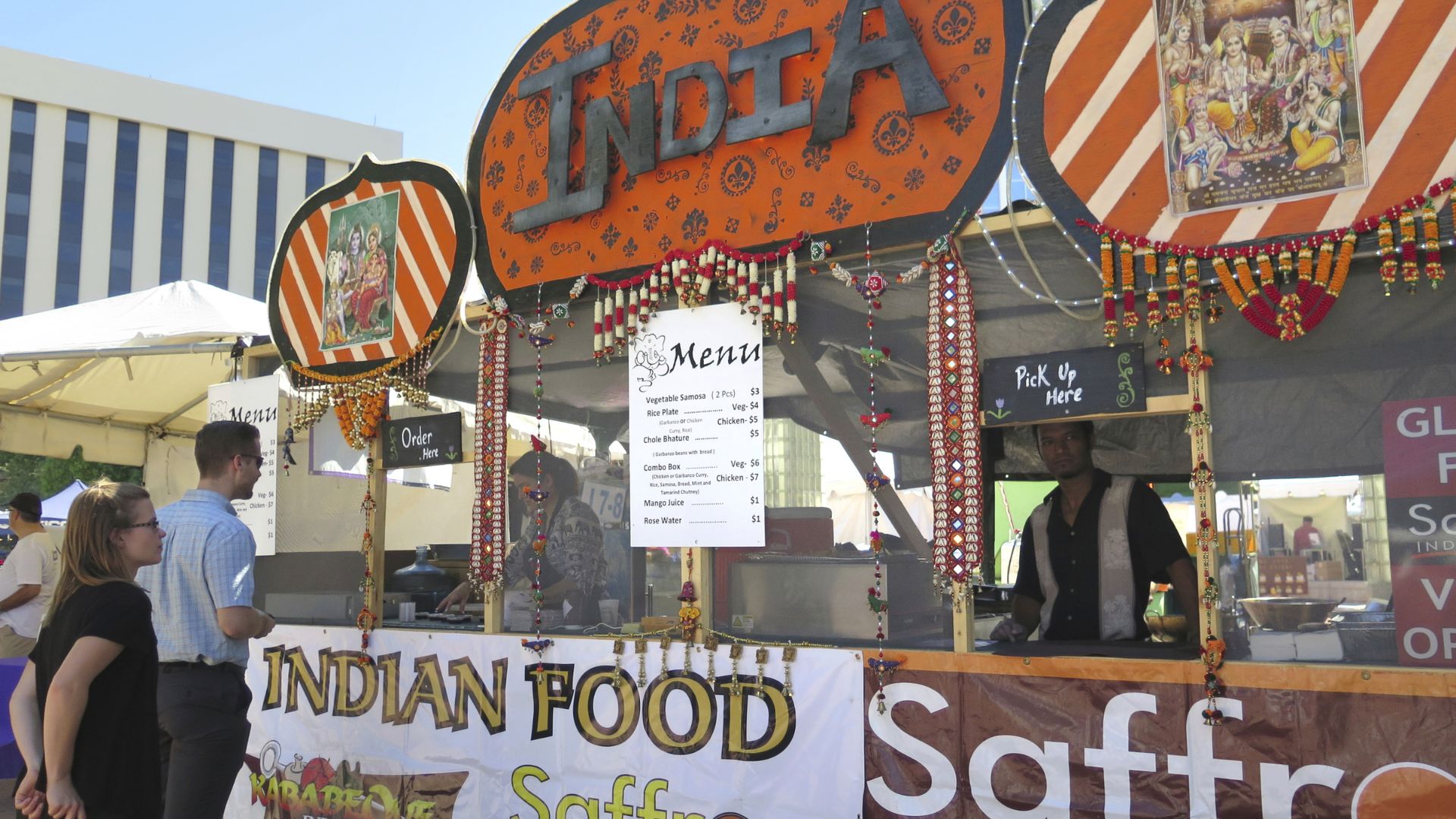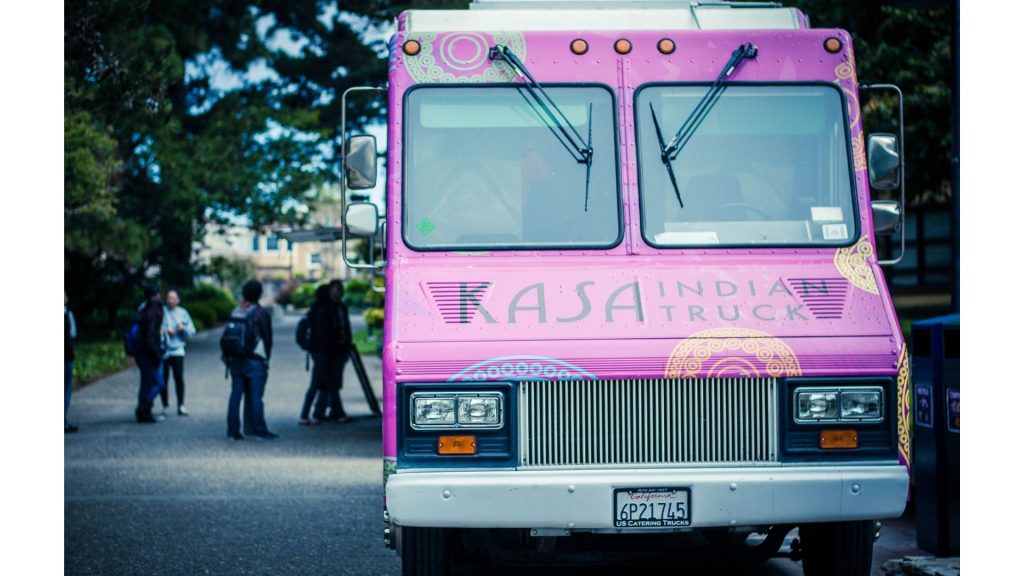U.S. universities are striving to offer a range of authentic global cuisines to its international students.
July 2018

An Indian food stall at the Tucson Meet Yourself festival, an annual celebration of the living traditional arts of Southern Arizona’s and Northern Mexico’s diverse ethnic and folk communities. The festival, founded by University of Arizona folklorist and anthropologist James “Big Jim” Griffith, sees an active participation of the university students, who make up about 40 to 50 percent of the volunteers. The parent organization of the festival is Southwest Folklife Alliance, an affiliate nonprofit organization of the University of Arizona’s College of Social and Behavioral Sciences. (Photograph by Astrid Galvan © AP Images)
Studying at a U.S. college or university can be an exciting new experience for many young adults. But for some, homesickness can make this move difficult. Being away from the comfort of home and having to adjust to the differences between the new and old environments can often lead to longing for familiarity. But beyond watching films in their language or logging on to Skype, those hungry for home may simply have to wander into their campus dining hall for a taste of comfort.
Universities across the United States are striving to offer cuisines that cater to international palates—a far cry from the hamburgers, macaroni and cheese, and Jell-O that used to be the only options once upon a time.
The University of Houston in Texas, for instance, has opened ethnic restaurants right on campus, and its food trucks offer a range of Asian cuisines. At the University of California, Berkeley, students can find more than a dozen food options within walking distance of the campus. And, at the Florida Institute of Technology, chef de cuisine Jon Skoviera and dining services director Tom Stewart explore world cuisine in their famed International Dinner Series.
The Melbourne-based institute has about 1,500 students who live on campus, roughly one-third of whom are international students from 120 countries, says Stewart. “We are very good at catering to our international students because we are, proudly, one of the nation’s most diverse universities,” he adds.
Students can pick from a range of dining options on campus. “We have three major dining locations and four other, smaller units,” says Stewart. “Those range from the ‘All-You-Care-To-Eat’ bounty of Panther Dining Hall, featuring a full-time international bar as well as a pizza buffet, pasta to order, home-style entrées with carvery and more, to our Sub Café & Deli with its salad bar and grill, to the smaller Library Coffee Shop and recreation center snack bar.”
Beyond these permanent fixtures, the university is known for its endeavor to cater to the palates of international students, as well as those curious to try world cuisine.
“Although we always catered to our international students with unique menu offerings in Panther Dining Hall, about four years ago, we started our groundbreaking and much-lauded International Dining Series [later rebranded as the International Dinner Series],” says Stewart. “In this series, we work with international student groups to feature the cuisine from their home countries or regions. The students help us plan the menu and research authentic recipes, and then participate in menu tastings to ensure the foods accurately represent their native dishes.”
On the day of the event, “the groups provide music, dance and cultural artifacts, dress in traditional attire, greet guests at the door and generally help convert a portion of the dining hall into something akin to their homeland,” he adds.
Florida Tech’s Indian student population is among the top five countries represented at the university, says Stewart. He adds that they are some of the university’s favorite groups to work with in preparing for the Indian International Dinner Series.
“They always come with enthusiasm and suggestions, dress up and participate fully in the occasion,” says Stewart. “Many of our student employees originate from India and South Asia.”
The Indian dinner series in 2017 featured entertainment by Florida Tech’s Indian Student Association, and the menu included vegetarian and non-vegetarian dishes like butter chicken, rogan josh, biryanis, naan, raita and sweets.

A food truck by KASA Indian Eatery, a local restaurant serving Indian food in San Francisco, at San Francisco State University in California. (Photograph by Rafael Castillo/Courtesy Flickr)
In addition to Indian food, offerings this academic year included the cuisines of the Caribbean, the Middle East, China, Africa and South America, culminating with a global Mother’s Day Brunch in May.
“[It] gives them a platform to brag about their home countries and share their pride with the full campus community and beyond. In addition, we provide specialized catering for many other smaller events held by various cultural student groups through our Office of International Student and Scholar Services,” says Stewart.
Special requests are always taken into consideration, and many of the popular menu items from the international events have been incorporated into the university’s regular menu cycle, says Stewart. This includes tikka masala, feijoada (Portuguese stew), Jamaican curry goat, Moroccan lamb tagine, the Chinese dish Mapo tofu, Mexican rice pudding arroz con leche and noodle bowls.
“We believe food plays a major role in making our students and our international staff and faculty comfortable in their surroundings. And, we offer every opportunity for our students to give us feedback to help them adjust to life away from home,” he says.
“Another of our wonderful events that is a favorite of the campus community and the broader region, and boasts of an outstanding culinary element, is our International Festival. We participate with the Office of International Student and Scholar Services to assist with this annual event, as well as the popular, albeit smaller, International Coffee Hours.”
The fun doesn’t end at the campus boundary line though.
“We market this series [International Dinner] to the public, where it has become extremely popular, bringing in 200 to 300 extra guests from the community. We attempt to do six to eight international-themed meals per academic year,” says Stewart.
The community has other ways of experiencing the meals, even if they don’t attend the dinners. Chef Skoviera publishes recipes and food photos from the events in the Florida Today newspaper. So, local residents can also enjoy these global dishes offered to students of Florida Tech.
Candice Yacono is a magazine and newspaper writer based in southern California.
COMMENTS